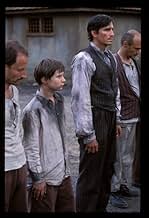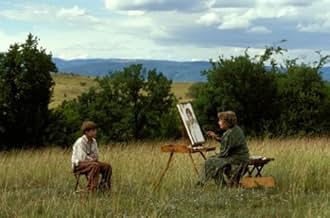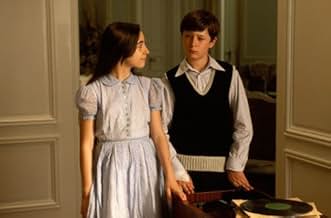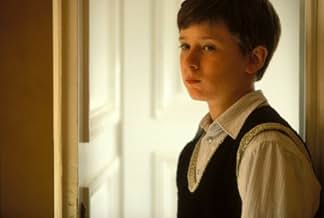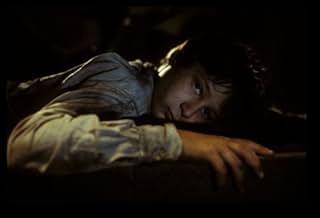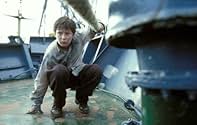IMDb रेटिंग
7.1/10
8.4 हज़ार
आपकी रेटिंग
अपनी भाषा में प्लॉट जोड़ेंA twelve-year-old boy escapes from a Bulgarian Communist concentration camp and sets out on a journey to reach Denmark.A twelve-year-old boy escapes from a Bulgarian Communist concentration camp and sets out on a journey to reach Denmark.A twelve-year-old boy escapes from a Bulgarian Communist concentration camp and sets out on a journey to reach Denmark.
- पुरस्कार
- 8 जीत और कुल 1 नामांकन
Krasimir Kutzoparov
- Camp Officer
- (as Krassimir Kutzuparov)
Diyan Machev
- Party Guest
- (as Deyan Machev)
फ़ीचर्ड समीक्षाएं
In 1952, the polyglot twelve year-old David (Ben Tibber), who was raised in the Communist Belene Prison Camp in Bulgaria, witnesses the death of his friend and protector Johannes (Jim Caviezel) and escapes from the concentration camp in the night. He is advised to mistrust everybody and together with a piece of bread, a compass, a piece of soap, a jackknife and a sealed envelope to be delivered in Denmark, he travels though Greece and Italy heading North. Along his journey, David discovers the beauty of the world and slowly he changes his behavior with people. When he meets Sophie (Joan Plowright), an old lady that lives in Switzerland and likes to paint as hobby, she asks David to paint his face; later she invites David to have lunch with her in her house, and David finally discloses his quest to her.
"I Am David" is a magnificent journey to the goodness of people. The expressive Ben Tibber has a stunning performance in the role of the boy David, who was raised confined in a concentration camp and surrounded by cruelties, that begins to smile and trust people along his travel through Europe. It is amazing how this young actor is able to transmit these sensations and emotions through his face and eyes. Joan Plowright performs a wise old woman that teaches David that most of the people are good and opens his heart. The direction, performances, cinematography, locations, pace, message etc., everything works perfectly in this great movie. Last but not the least, the conclusion is heartbreaking. My vote is nine.
Title (Brazil): Not Available
"I Am David" is a magnificent journey to the goodness of people. The expressive Ben Tibber has a stunning performance in the role of the boy David, who was raised confined in a concentration camp and surrounded by cruelties, that begins to smile and trust people along his travel through Europe. It is amazing how this young actor is able to transmit these sensations and emotions through his face and eyes. Joan Plowright performs a wise old woman that teaches David that most of the people are good and opens his heart. The direction, performances, cinematography, locations, pace, message etc., everything works perfectly in this great movie. Last but not the least, the conclusion is heartbreaking. My vote is nine.
Title (Brazil): Not Available
There's just so much to say about "I am David" that I feel like I can't get it all in. From the directing, to the script; from the photography to the acting... it all just works.
This movie is a breath of fresh air from the Hollywood machine that churns out lifeless epics, tasteless comedies, and meaningless dramas in the name of money. "I Am David" aims not to collect big at the box office, but to convey passion and art through cinema.
It follows the escape of a young boy named David from a concentration camp during the Bulgarian War. Carrying only a small satchel with a mysterious envelope and a few other items, David sets across the countryside to reach Denmark. He doesn't know (and neither do we until the end) why he's going to Denmark or what's in the envelope; he's just doing as instructed by a mentor at the concentration camp.
The characters in the film are phenomenal. Jim Caviezel's character is surprisingly absent for most of the film; but nevertheless is an integral part of the story. (I have yet to see him in a role that I didn't like.) I don't think you could draw up a more perfect child actor for the role of David than Ben Tibber. His performance in this movie is Oscar-worthy to me. And Joan Plowright (you'll recognize her from "Dennis the Menace") is verrrrry convincing in her role. Director Paul Feig has a cameo in the movie.
The soundtrack and colors work wonders; taking your breath away with each shot. The Damien Rice piece at the end is very heartfelt and true to the movie as well. The limited dialogue makes the characters seem simple, yet true to life.
Without giving too much away, I highly recommend this movie to EVERYONE. It's charming, funny, sad, and inspirational. Most movies these days have no redeeming value whatsoever, but with "David" this is not the case. It saddens me that Americans would prefer the rehashed, regurgitated crap of Hollywood over this brilliant work of art. I'm not familiar with Feig's work, but following this movie, I'm going to be sure to check out other works by him.
Please watch this one. It's a real winner.
This movie is a breath of fresh air from the Hollywood machine that churns out lifeless epics, tasteless comedies, and meaningless dramas in the name of money. "I Am David" aims not to collect big at the box office, but to convey passion and art through cinema.
It follows the escape of a young boy named David from a concentration camp during the Bulgarian War. Carrying only a small satchel with a mysterious envelope and a few other items, David sets across the countryside to reach Denmark. He doesn't know (and neither do we until the end) why he's going to Denmark or what's in the envelope; he's just doing as instructed by a mentor at the concentration camp.
The characters in the film are phenomenal. Jim Caviezel's character is surprisingly absent for most of the film; but nevertheless is an integral part of the story. (I have yet to see him in a role that I didn't like.) I don't think you could draw up a more perfect child actor for the role of David than Ben Tibber. His performance in this movie is Oscar-worthy to me. And Joan Plowright (you'll recognize her from "Dennis the Menace") is verrrrry convincing in her role. Director Paul Feig has a cameo in the movie.
The soundtrack and colors work wonders; taking your breath away with each shot. The Damien Rice piece at the end is very heartfelt and true to the movie as well. The limited dialogue makes the characters seem simple, yet true to life.
Without giving too much away, I highly recommend this movie to EVERYONE. It's charming, funny, sad, and inspirational. Most movies these days have no redeeming value whatsoever, but with "David" this is not the case. It saddens me that Americans would prefer the rehashed, regurgitated crap of Hollywood over this brilliant work of art. I'm not familiar with Feig's work, but following this movie, I'm going to be sure to check out other works by him.
Please watch this one. It's a real winner.
Greetings again from the darkness. A very touching, heartfelt film without the Hollywood gloss, "I Am David" takes us on a journey of hope and discovery. We get to experience the world through the eyes of a first timer. Ben Tibber (a child actor well-schooled at the Tiny Tim role) follows the advice he is given prior to his escape from concentration camp as his journey takes him throughout Europe. While in the camp, David befriends Jim Caviezel ("The Passion of the Christ" and the upcoming Bobby Jones biopic). Caviezil's courageous death sets in motion the plan to allow for David's escape. Tibber's expressive eyes and the breathtaking countryside scenery carry the film until Joan Plowright explodes on the screen. The movie really gains spirit at this point, but regrettably, this is also where it appears the producers ran out of money. The last 10 minutes of the film are harried and rushed with little dialogue. The result is a wonderful ending spoiled. Still, the film is a delight to watch and will tug at your heartstrings as you admire and pull for David to complete his journey. Couldn't help but notice that at the concentration camp, The Man is played by Bulgarian actor Hristo Shopov, who also played (to a chilling effect) Pontius Pilate is "The Passion of the Christ".
10jgbush
This movie speaks to the purest parts of the soul, beckoning the viewer to take not just a journey with David, but to the innermost parts of themselves.
If you know someone who is crying out to be heard and understood, someone desperately seeking a safe person to reach out to but doesn't know how to take that first step.....encourage them to go on a journey with this young boy through a harrowing physical and emotional journey of his life.
This movie touched me in a way that very few have. In fact, it moved me so much I had to tell many friends and family members and they too agreed...it is a beautiful story to watch and celebrate. Some have emailed me the day after and said...."We were up late at night with our son...clapping and crying during the final scenes." To the cast and crew of this film....thanks for using your talents to warm our hearts and help us believe again in the good hearts of those around us.
If you know someone who is crying out to be heard and understood, someone desperately seeking a safe person to reach out to but doesn't know how to take that first step.....encourage them to go on a journey with this young boy through a harrowing physical and emotional journey of his life.
This movie touched me in a way that very few have. In fact, it moved me so much I had to tell many friends and family members and they too agreed...it is a beautiful story to watch and celebrate. Some have emailed me the day after and said...."We were up late at night with our son...clapping and crying during the final scenes." To the cast and crew of this film....thanks for using your talents to warm our hearts and help us believe again in the good hearts of those around us.
In a day when few films are wholesome or uplifting, this film was a breath of fresh air. All those who have made negative remarks about Ben Tibber's performance - it is clear you have never met anyone from Bulgaria. His stoic and serious role was accurate and well done.
As I did not know anything about this movie when I watched it, it seemed slow and at times frustrating. However, I am extremely glad I watched the entire film, as the message of this film is outstanding.
It is unfortunate that many have forgotten that films can be educational as well as entertaining, and uplifting as well as meaningful. Children and adults alike can learn history through films such as I Am David, as they experience stories they may have forever been ignorant of if not for the makers of this film.
As I did not know anything about this movie when I watched it, it seemed slow and at times frustrating. However, I am extremely glad I watched the entire film, as the message of this film is outstanding.
It is unfortunate that many have forgotten that films can be educational as well as entertaining, and uplifting as well as meaningful. Children and adults alike can learn history through films such as I Am David, as they experience stories they may have forever been ignorant of if not for the makers of this film.
क्या आपको पता है
- ट्रिवियाStewart Copeland, drummer for rock band The Police, composed the soundtrack for this movie. For inspiration, he immersed himself in Eastern European Gypsy and folk music.
- गूफ़When Maria shows David a globe, David asks her to show him Denmark. The camera focuses on Denmark, then traces down the globe to Italy. Though antique in appearance, modern country names on the globe (Czech Republic, Slovakia, Bosnia) show it dates at least from 1993.
- कनेक्शनReferenced in बेंचवोर्मर्स (2006)
- साउंडट्रैकRuphinka is Taken Ill
Written by Kosta Kolev
Performed by Vesselin Djigov
Courtesy of Bulgarian National Radio
टॉप पसंद
रेटिंग देने के लिए साइन-इन करें और वैयक्तिकृत सुझावों के लिए वॉचलिस्ट करें
- How long is I Am David?Alexa द्वारा संचालित
विवरण
बॉक्स ऑफ़िस
- US और कनाडा में सकल
- $2,88,552
- US और कनाडा में पहले सप्ताह में कुल कमाई
- $1,60,346
- 5 दिस॰ 2004
- दुनिया भर में सकल
- $3,29,577
- चलने की अवधि
- 1 घं 30 मि(90 min)
- रंग
- ध्वनि मिश्रण
- पक्ष अनुपात
- 1.85 : 1
इस पेज में योगदान दें
किसी बदलाव का सुझाव दें या अनुपलब्ध कॉन्टेंट जोड़ें



